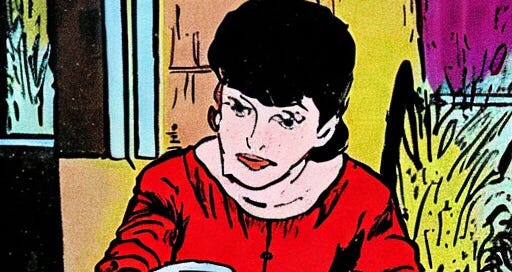Sometimes, I look back on the recent past — increasingly, the only past I can remember — and shake my head at how stupid it all was, what a sinful waste of passing, irrecuperable time. For about three of the months of the Covidian era, when I was working at the store, I spent hours every day sanitizing shopping baskets. I sprayed them, once they had been returned by customers, spritzed them with what was supposed to be a disinfecting agent; wiped them down, and stacked them up for the convenience of incoming guests, as we were instructed to call them. This dull, repetitive, thankless chore was performed publicly, if not gladly, al fresco, immediately adjacent to entrance, conspicuously, visibly, the better to assure the plague-leery public that all precautions were being taken to ensure their continuance, never mind that the virus was already known to be airborne and not lurking in the tight braiding of the conveyance’s plastic weave, eager to transfer its affections to a rutabaga and thereby stoop to conquer. It was a performative ploy, nothing more.
The only benefit, as far as I was concerned, was that I was often heir to the shopping lists that were left behind, nestled among the surplus bread ties and unwanted beet or carrot greens. Something about them appealed: the handwriting, the scraps of paper on which they were hastily scrawled, the priorities of whoever the generator betrayed by their ordering, the blind half-raised on the fusty room of other people’s requirements, the challenge of divining what would be for dinner. Spaghetti carbonara! Chicken Marbella! Tiramisu! I kept them for a while, obedient to some murky archival instinct, but eventually got rid of them. The only one I remember by heart itemized only two items, neither available at the store: Batteries. Lube. It reminded me of Tallulah Bankhead, of her last words, which are said to have been, “Codeine. Bourbon.”
I love a good list, whether the cataloguing is deliberate and functional — as in, say, the shopping example or something more regimented, like a passenger manifest — or the possibly unintended consequence of a descriptive impulse run a bit amok. Here’s Mavis Gallant, in wonderfully unrestrained flight, on two successive pages in her novel, A Fairly Good Time (1970):
He had begun his research on the enigma of nursery rhymes as part of an investigation his magazine was conducting into the Parisian sub-society of soothsayers, prophets and demonologists spawned during the Algerian War. That war had ended but the city had not settled down: bombs, tracts, threats, blackmail and vengeful trials were a diminishing cause of excitement, for which one substituted tales of royal babies switched in their cradles, medieval monks who turned up reincarnated as atomic scientists, Christ sent back to earth and working hard at the hydroelectric station of Krasnoiarsky Krai in central Siberia, continents that sank like stones, swarms of bees commuting regularly between the planets Neptune and Venus, children raised by wild beasts and revealed to be without neuroses, cancer cures suppressed by powerful interests in Berne and Washington, Shamanism among the clergy and Freemasons in the charge of banks.
and then —
She was driven to obsessive conjecturing about Geneviève. She imagined her pallor, her bruised-looking eyes, her Botticelli hair, her Mexican silver earrings, her unusually small vagina — an attribute which Geneviève mentioned in her letters from time to time and which Shirley took to be a sign of refinement, like having no appetite — and her tightly tuned speaking voice. She knew from an assiduous reading of Geneviève’s letters to Philip that she suffered in both spirit and body because of her ethnologist husband’s persistent conjugal demands, which were made “quite without provocation, on the contrary,” in trains, in the cinema at Orly Airport, in the Peugeot 403 “alongside the Western Autoroute, where it is forbidden to park,” in the dining room while waiting for guests to arrive, in the Egyptian section of the Louvre on a winter afternoon just before closing time and, finally, in the presence of their four-year-old son whom the ethnologist was trying to goad to a parricidal fury in order to prove, or disprove, some incursion the Freudians had made in ethnology’s private field.
There are other such inventories, as merry and even merrier, that bear citation; another time, perhaps.

A Fairly Good Time is the tragicomic account of the dissolution of a marriage over the course of the hot Parisian summer of 1963. Shirley and Philippe are coming apart. One of the wedges — its thin end ever-thickening — is Philippe’s intense, ostensibly platonic friendship with Geneviève, whose confessional novel-in-progress is among his papers, and which Shirley reads, covertly, though with less inner turmoil than such an intrusion might warrant. This Bluebeard business of opening doors and going through drawers that might better have been left closed is a theme in Mavis Gallant’s writing. It come up, for instance, in her short story, collected in The Pegnitz Junction, “An Alien Flower.” The narrator is Helga, married to Julius. They live in Cologne, among the ashes of war. They have an old poodle, Heidi. Their daughter is Roma, named for the city where she was conceived. (This reminds me of Tallulah Bankhead, who was named for her grandmother, also Tallulah, who was named in honour of Tallulah Falls, in Georgia, likewise the site (so it’s said) of her conception. Tallulah, I’ve read, is a Cherokee word, onomatopoeic, meaning something like, “a beautiful sound.”) It’s while she’s pregnant with Roma, her first child, that Helga finds, in a dark closet recess, a diary kept by one of the young women with whom Julius is having an extramarital adventure. Reading it is both devastating and liberating.
“An Alien Flower” is compact, the writing tight, restrained, unindulgent. There’s not much in the way of list-making, save this seven-point instance:
“Monday — Conversation with Arab student in canteen. Interesting.” “Tuesday — Funtumia latifolia is a tree in Western Africa.” “Wednesday — Heidi dead.” “Thursday — Roma draws Papa, Mama, Aunt Bibi, self, a tombstone for Heidi. Accept drawing as gift.” “Friday — Menses.” “Saturday — Allied Powers forbid demonstrations against rearmament.” “Sunday — Visit kennel. New puppy for Roma. Roma undecided.”
Here, too, Helga is reading a diary not of her own keeping; it belongs to Bibi, who’s really the centrepiece of the story. Bibi has been displaced by the war. Her affect is simple, dim, but she proves to be brilliant. She begins to work for Julius in his research laboratory, and to do graduate work at the university. At the same time, she is also a kind of housekeeper / babysitter for the family. Bibi, too, is one of Julius’s conquests, as Helga comes to understand. The relationship between the two women is quietly fraught. Helga notes,
Of course we never considered Bibi a servant! That is a pure invention. From the very beginning — when we were, in fact, her employers — she ate at our table and called us Julius and Helga.
This reminds me of Tallulah Bankhead, who saw nothing amiss in fraternizing with the hired help. For a few years, in the early 40’s, her base of operations was a country house she called Windows, in Bedford Falls, New York. Among her many guests was the Canadian painter Charles Redfern. He was in residence when Tallulah was interviewing a couple from North Carolina, Sylvester and Lillian Oglesby, to oversee the kitchen. Some time later, Redfern wrote his hostess:
I picture you every day at “Windows” and often wonder how Sylvester the butler worked out. That interview I’ll never forget. It began with his asking what the hours would be, and your reply (and this is considerably shortened) was, “Well, darling, I live a very quiet life in the country and I can’t say it’s any different from any other country place, except that people do come and go and never get up early so that part of the day, darling, isn’t difficult. What are you drinking, bourbon? Dinner is different, naturally we do sit down unless of course the Giants are playing and no one can move if there’s a game on but it never lasts forever and we’re never more than six for dinner because you see my table is oval and won’t seat any more unless of course we have a buffet which is generally on Sunday and then any number of people can eat which, of course, they never do if it’s hot because the pool is cooler d’you know, darling, and if supper is cold it doesn’t matter anyway and I have a bird that says who are you and laughs just like me and Gaylord my parakeet who drinks champagne, don’t you, darling, and I like hot bath in the morning around three in the afternoon and breakfast on a tray, does your wife know how to make vichyssoise?”
This is cited in Taullulah, by Brendan Gill (Holt, Rinehart, and Winston, 1972). Large portions of the text appeared in two instalments in The New Yorker; the first was in the issue of October 7, 1972, which was also where “An Alien Flower,” was first published. In that same text, Gill also wrote:
She appeared to forget nothing she read, and she read continuously and omnivorously—books, magazines, newspapers, and, failing them, labels on bottles and cans, messages on matchbook covers.
I like that. In the substantial and the ephemeral, in high art and in low, there’s something worth noting, even to the extent of writing it down. This is all by way of getting around to saying that I’m trying out a new venture, a kind of commonplace book where I’ll keep track of my reading and map the connections that come from it. I’m calling it “The Bankhead Gleaner” because I have to call it something. I’ll take it seriously, though I don’t expect anyone else to hang on every word or embrace my Kabbalistic meanderings. For me, it’s a way to channel time, of which I now have a great deal. It’s a way to impose order on days where order is sorely lacking. If anyone else finds something of interest here, well, good.
“Onward,” was Tallulah’s motto. What was Mavis’s? I’m not sure. I wonder if it might have been the line she was known to quote, from Pasternak, “Only personal independence matters.” Both apply here. Thanks for reading.







I love, love, love the second quote from "A Fairly Good Time" and the Tallulah monologue. Also, your AI suggestions are inspired.